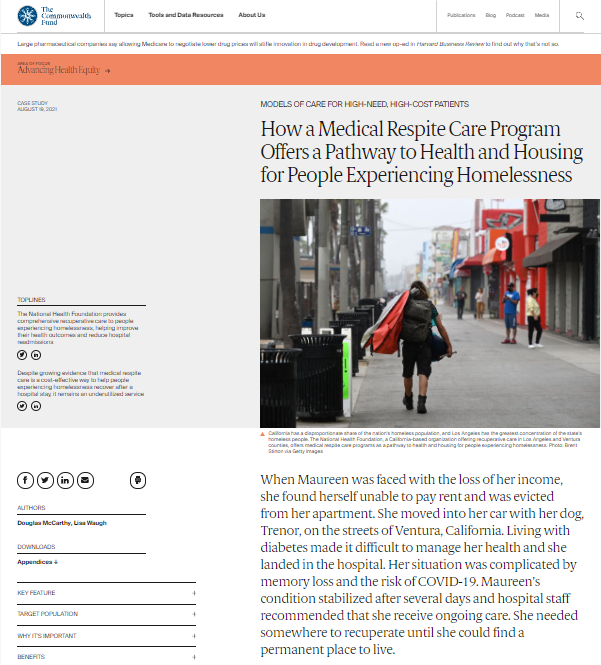Headline
A medical respite program for people experiencing homelessness shows evidence of reduced hospital readmissions and emergency department revisits.
Context
People experiencing homelessness are at higher risk of having prolonged hospital stays, repeated emergency department (ED) visits, and poor health outcomes. Medical respite programs provide short-term acute or postacute care in a residential setting to individuals experiencing homelessness. These programs have evidence of promoting recovery, reducing overall cost of care, and preventing homelessness. This case study profiles a medical respite program at the California-based National Health Foundation (NHF) and describes program outcomes, staffing and other program characteristics, program financing opportunities, and insights from staff at NHF and other key organizations.
Findings
In 2020, 44 percent of NHF guests transitioned to stable housing and 15 percent were reunited with family following a 14-day average respite stay. A hospital system’s analysis showed that of 64 patients discharged to the NHF respite care program, only nine percent were readmitted to the hospital and 23 percent presented at the ED with 30 days. Through NHF’s respite care program, licensed vocational nurses assist guests with medication management and care coordination using principles of trauma-informed care and harm reduction. NHF funds this program through contracts with partnering hospitals and Medicaid managed care plans. Federal Medicaid waivers such as California Advancing and Innovating Medi-Cal will allow managed care plans to pay for medical respite care, which may be useful for other states interested in financing these services. The case study includes links to resources that outline the standards for medical respite care programs and selected evidence for medical respite care outcomes.
Takeaways
Discharging patients experiencing homelessness to medical respite programs from the hospital can help reduce readmissions, improve health outcomes, and reduce homelessness. Payers and providers can use this case study to create a business case for incorporating medical respite care as a part of the care continuum for patients experiencing homelessness.


